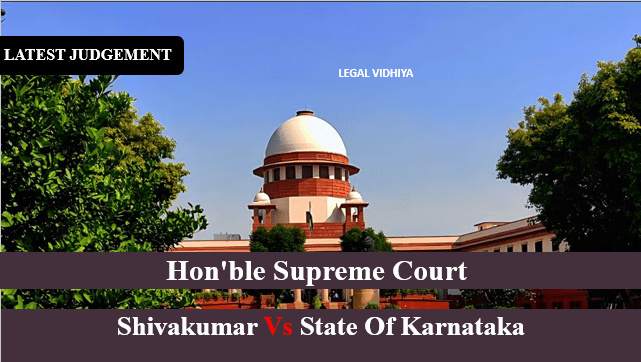
| Citation | 2024 INSC 156 |
| Date of Judgement | 1 March 2024 |
| Court | Supreme court of India |
| Appellant | SHIVA KUMAR |
| Respondent | State of Karnataka |
| Bench | Bela M. Trivedi |
Introduction
The appellant’s appeal against the conviction, initially sentenced to three years of rigorous imprisonment, was dismissed by the High Court, which upheld the trial court’s decision. The Supreme Court, considering relevant case laws, affirmed the High Court’s decision, emphasizing the lack of action by close relatives regarding the alleged harassment, casting doubt on the prosecution’s case.
Facts of the Case
The prosecutor’s case concerns the candidate who previously lived in the house of the deceased as a tenant. On 5 July 2000, when the deceased returned home after taking her sister’s children to school, the appellant approached her near Canara Bank and demanded marriage. When she refused, he threatened her and her family. The deceased reported the incident to his sisters, ate poison at home and was later found by neighbours in a critical condition. Despite medical measures, he died on July 6, 2000.The police registered a case under Section 306 of the IPC and during investigation, chemical analysis revealed the presence of organophosphate pesticide, indicating death due to consumption of a toxic substance.
In court, the prosecutor presented thirteen witnesses and eleven documents. The appellant was investigated on the basis of § 313 of the Code of Criminal Procedure. The Supreme Court upheld the decision, but found no reason to interfere. However, the examination of the evidence revealed contradictions and gaps. Differences arose in the testimony of the father of the deceased (PW-1) and sister (PW-2) regarding the composition of the home and the presence of the father during the incident. PW-2 disputed PW-1’s claim of living with the deceased, casting doubt on PW-1’s credibility. This contradiction, together with PW-1’s late visit to the hospital, cast doubt on the prosecution’s version of the events The Supreme Court found those differences to be indicative of the possible unreliability of the prosecution.
Issued Raised
This special leave appeal challenges the appellant’s conviction under Section 306 of the Indian Penal Code (IPC). Initially, the Fast Track Court – III Mysore convicted the appellant and sentenced him to imprisonment for three years and imposed a fine of Rs. 2000.
The appellant’s appeal to the High Court of Karnataka, Criminal Appeal No. 1139/2004 (SJ-A) was then dismissed, upholding the judgment of the trial court. , as stated in the first part of the information filed on 7th July, 2000. .During the proceedings, it was contended that the High Court upheld the conviction of the appellant citing relevant jurisprudence such as Ude Singh and others Vs. State of Haryana (2019) 17 SCC 301 and Mahendra K.C. Vs. State of Karnataka and another (2022) 2 SCC 129.
The evidence adduced highlighted that none of the close relatives of the deceased including PW-1, PW-2, PW-4 and PW-12 were exposed for the alleged harassment of the deceased by the appellant for marriage proposals. Although they were aware of the harassment, they did not register a criminal complaint, casting doubt on the prosecution’s version of the events. The inaction of the relatives raised serious doubts about the reliability of the prosecutor’s case.
According to these circumstances, the Supreme Court investigated the case and found striking contradictions and material deficiencies, especially in the statements of the deceased father and witnesses Sister these differences questioned the reliability of the report of the prosecutor, therefore the Supreme Court considered the appeal in detail.
Contentions of Appealent
The trail court, in the evidence presented, found the appellant guilty of inciting the suicide of the deceased, sentenced him to three years’ imprisonment and imposed a fine of Rs. 2000.
Counsel for the appellant, on the other hand, claims that both the trial court and the Supreme Court did not appreciate the evidence properly and submits that the conviction under Section 306 of the IPC is not supported by the evidence on the wrist, referring to the past. Events and possibly indicating suicidal tendencies. Moreover, the delay in filing the First Information Report (FIR) and the negligence of the deceased in relation to the alleged molestation of the appellant cast doubt on the prosecution. The recent marriage of the appellant, just two months before the incident, is presented as further evidence against a motive for threatening the deceased.
On the contrary, counsel for the respondent claims that the evidence points unequivocally to the guilt of the appellant. They argue that the prosecution established beyond a reasonable doubt the assistance of the appellant in the suicide of the deceased. Therefore, the decision of the district court and the sentence imposed are considered justified under section 306 of the Criminal Code.
Contention of Respondent
Counsel for the appellant highlights significant inconsistencies and inconsistencies in the testimony of the prosecution witnesses and submits that the prosecution is unable to establish any motivation of suicide against the appellant. They point out that crucial witnesses, including relatives of the deceased, gave conflicting statements.
For example, PW-1, the father of the deceased, was living separately with another woman out of wedlock since the time of the deceased, which casts doubt on his credibility. Moreover, the sister of the deceased, PW-2, did not initially tell the police about the harassment by the appellant and mentioned it only later in her statements. Similarly, the brother-in-law of the deceased PW-3 testified that he did not know about the molestation before the date of the incident.
There are still contradictions in the circumstances of the case. From the evidence of PW-3, it is clear that the deceased confessed the poison due to the harassment of the appellant but he did not hear it directly from the deceased. Furthermore, the investigating officer PW-11 did not include in the police report of PW-2 the relevant information about the appellant’s threat to the deceased.
In conclusion, the appellant’s counsel submits that the case of the prosecution is not persuasive because of these contradictions and there is insufficient evidence under Section 306 of the IPC to support the conviction. They claim that the appellant’s alleged motivation to commit suicide remains unfounded and urge the court to reconsider the sentence.
Judgement
The court concluded that there was insufficient evidence to prove that the appellant had abetted the suicide of the deceased. Here’s a breakdown of the key points:
Facts of the Case: The court reviewed the facts presented and found no substantial evidence to support the charge of abetment of suicide against the appellant.
Lack of Evidence: The court emphasized that while the death of the young woman was tragic, there was no conclusive evidence to prove that it was a suicide. Additionally, there was insufficient evidence to establish that the appellant had abetted the suicide.
Legal Position: The court mentioned the settled legal position regarding the burden of proof in criminal cases, emphasizing that the prosecution must establish guilt beyond a reasonable doubt.
Decision: Based on the lack of evidence and the failure of the prosecution to prove its case, the court set aside the conviction of the appellant under Section 306 of the IPC.
Discharge of Bail Bonds: Since the appellant was already on bail, the court ordered that the bail bonds be discharged.
Analysis
The case concerns a situation where the prosecution tries to prove that the accused encouraged the deceased to commit suicide. The court refers to previous decisions when defining “incitement”. Incitement implies inciting, inciting, provoking, inciting or encouraging someone to do something. It does not necessarily require special words; the act or conduct may also be incitement. To prove incitement, it must be shown that the accused intentionally encouraged, instigated or encouraged the deceased to kill himself. Mere harassment or cruelty without direct affirmative action by the accused is not sufficient to convict under Section 306 of the Penal Code.
The court emphasizes that the accused must prove manhood or guilt. The accused must have a clear intention to force the deceased into a state where he commits suicide. The court also warns against basing the finding of guilt solely on the victim’s hypersensitivity to ordinary family quarrels. Circumstances leading to suicide must be carefully evaluated. On the whole, the cited statutes and judgments emphasize the need for clear proof of the deliberate instigation or active participation of the accused in the suicide in order to convict under Section 306 IPC. Harassment or cruelty alone are not sufficient grounds for conviction.
Conclusion
PW-13 testified that the organophosphorus compound found in the deceased’s blood is a pesticide. However, the amount of poison in the blood was not specified in the Forensic Science Laboratory (FSL) report. Additionally, PW-13 could not determine the time when the deceased consumed the poison.The relevant legal provisions regarding abetment of suicide under Section 306 of the Indian Penal Code (IPC) were discussed, emphasizing the need to prove instigation or intentional aiding by the accused. Instigation involves provoking, inciting, urging, or encouraging someone to commit an act. It requires a clear intention to provoke, urge, or encourage the deceased to commit suicide.
Several case laws were cited to illustrate the interpretation of “instigation” and the requirements for proving abetment of suicide. The courts stressed that mere harassment or cruelty without positive action on the part of the accused proximate to the suicide is insufficient for conviction under Section 306 IPC. There must be proof of direct or indirect incitement to suicide by the accused.
After reviewing the evidence and legal arguments, the court concluded that the prosecution failed to prove the charge of abetment to commit suicide against the appellant. Therefore, the conviction under Section 306 IPC was set aside, and the appellant’s appeal was allowed. The bail bonds were discharged, and no costs were imposed.
References
https://indiankanoon.org/doc/136721126/.
Written by Aakash Raghuvanshi an intern under legal vidhiya.
Disclaimer: The materials provided herein are intended solely for informational purposes. Accessing or using the site or the materials does not establish an attorney-client relationship. The information presented on this site is not to be construed as legal or professional advice, and it should not be relied upon for such purposes or used as a substitute for advice from a licensed attorney in your state. Additionally, the viewpoint presented by the author is of a personal nature.






0 Comments